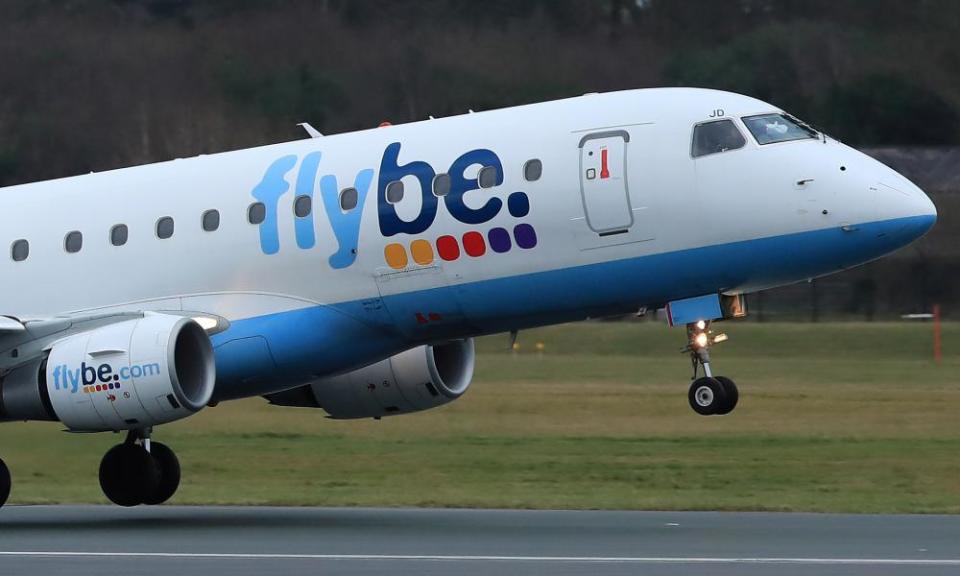Flybe: government considers air passenger duty cut to save airline

Emergency talks were taking place between the chancellor, Sajid Javid, and the business and transport departments, amid attempts to ensure the survival of Flybe, Europe’s largest regional carrier.
The government is considering whether to cut air passenger duty on all domestic flights, allowing the Exeter-based airline to defer a tax bill of about £100m for three years. The rescue proposal would give Flybe time to implement a turnaround plan, and would also avoid a breach of EU state aid rules, but immediately drew criticism from environmental groups.
Boris Johnson told BBC Breakfast the government was “working very hard to do what we can” for Flybe, which carries 8.5 million passengers a year between 56 airports across the UK and mainland Europe.
Air passenger duty, or APD, is a British tax on aviation, introduced in 1994. It is charged on each passenger on flights departing from the UK, and set according to the distance of their final destination and the class of travel.
Destinations are grouped into two bands, above and below 2,000 miles from London, and charged at three rates – effectively for economy class, premium economy and business/first-class seats. All short-haul flights to Europe, including domestic, are charged in the same band, rising from £13 in economy to £78 in first class. A long-haul first-class flight now attracts APD of £528.
Airlines have long lobbied against the tax, particularly after the rates were doubled in 2007.
Flybe has argued that it is especially hard hit as the tax only applies to UK departures, and is therefore applied to each leg of a domestic return flight. That means, for example, that a return flight from Cardiff to Manchester is taxed at £26, while an international return flight from the UK to Moscow pays £13 in APD.
Long-haul flights from Northern Ireland are exempt from APD, as well as departures from remote parts of Scotland.
“There are limits commercially to what a government can do to rescue any particular firm but what we will do is ensure that we have the regional connectivity that this country needs,” the prime minister said. Improving regional connectivity was a Conservative manifesto pledge.
The shadow chancellor, John McDonnell, called on the government to work with the airline and unions to look at “targeted assistance to support routes judged on economic, environmental and social grounds”.
“Bailing out a company through a tax cut across the industry is not the way forward,” McDonnell said.
Flybe operates almost two in five British domestic flights, and 2,000 jobs are at risk if the company fails, a year after it was rescued by a consortium led by Virgin Atlantic.
Garry Graham, the deputy general secretary of the trade union Prospect, which represents hundreds of workers at the airline, said Flybe’s difficulties were “an early acid test of this government’s commitment to every region of the UK”.
“Large numbers of Flybe’s routes provide important transport connections to and from parts of the UK where other viable options don’t exist. Indeed, a number of regional airports are highly reliant on Flybe for most or all of their scheduled services,” he added.
Regional connections within the UK could be at risk if Flybe collapses, the chairman of Newquay airport told the BBC. Tim Jeans told Radio 4’s Today programme that competitors would not necessarily rush to replace some of the airline’s routes.
“Flybe are by far and away the largest UK domestic airline and there are relatively few other players in that market. The routes that it flies are too small for easyJet and Ryanair with their 150- to 180-seat aircraft,” he said.
The air passenger duty proposals have attracted criticism from environmental groups and campaigners. Greenpeace UK’s chief scientist, Doug Parr, said it was a “poorly thought-out policy that should be immediately grounded”.
Cutting air passenger duty encourages flying and should not be messed with/reduced in order to save a struggling airline
IF this becomes response of govt confronting tricky industrial issue, can be little hope for UK decarbonisation effortshttps://t.co/ro910rgpV0— Doug Parr (@doug_parr) January 14, 2020
“The government cannot claim to be a global leader on tackling the climate emergency one day, then making the most carbon-intensive kind of travel cheaper the next. Cutting the cost of domestic flights while allowing train fares to rise is the exact opposite of what we need if we’re to cut climate-wrecking emissions from transport.”
The MEP for South West England, whose constituency includes Flybe’s Exeter home, also rejected the proposals to cut air passenger duty.
Molly Scott Cato of the Green party said it was “absurd to suggest that we should provide a further boost to the aviation industry”. She suggested the south-west’s tourism industry could benefit from a general rise in the cost of flying, to encourage more breaks in the UK. She highlighted that routes deemed socially necessary could be subsidised under EU rules – Flybe’s Newquay to London route is already funded with state aid.
Air passenger duty (APD) is charged on each passenger on a flight departing from the UK, and is set according to the distance of their final destination, and the class of travel. All short-haul economy flights to Europe, including domestic, are charged at the same price, £13. Airlines have long lobbied against the tax, which applies to UK departures only.
Flybe has argued that it is particularly hard-hit, as the rate is applied to each leg of a domestic return flight. That means, for example, that a return flight from Cardiff to Manchester is taxed at £26, while the duty on a Glasgow to Malaga return costs half that.
The Scottish government abandoned its controversial plans to scrap aviation tax in 2019, after it introduced a pledge to cut Scotland’s carbon emissions to net zero by 2045.
Flybe flights were operating as normal on Tuesday.

 Yahoo Finance
Yahoo Finance 